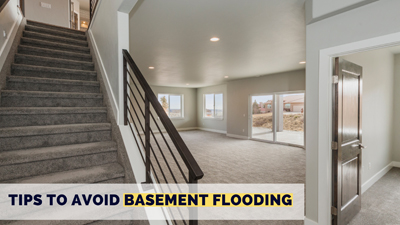A complete inspection with a written report designed to inform and
educate a buyer about the overall condition of the home.
Tips to Avoid Basement Flooding
 The Federal Emergency Management Agency warns that flooding in basements can occur in any home. This is most likely to occur during heavy rainfall or when snow and ice start to melt.
The Federal Emergency Management Agency warns that flooding in basements can occur in any home. This is most likely to occur during heavy rainfall or when snow and ice start to melt.
If you’ve ever experienced basement flooding, you know just how stressful and tedious the clean-up process can be. It is the last thing you want in your home. Your new carpet can quickly become a moldy sponge after flooding. Plus, you'll be left with ruined possessions and countless hours of cleaning.
Fortunately, there are some ways to prevent it. Here are some of them.
Clean gutters
Blocked gutters are considered one of the most common causes of flooding. Keeping your gutters clean is one of the easiest ways to prevent flooding in your basement.
To ensure that water flows freely, keep your gutters free of leaves and other debris. It will not only save you from foundation problems, but it will also prevent water from seeping into your basement.
Install a sump pump
If you experience basement flooding on a regular basis, we recommend installing a sump pump. This device will as your first line of defense against flooding. It will help keep water from building up in the basement.
If you have one installed in your basement, be sure to test it regularly. Pour a bucket of water into the sump pump. You know it is in good working order if it turns on, pumps up the water, and then shuts off automatically.
Inspect and repair foundation cracks
Another way to protect your home from flood and water damage is by sealing any cracks as soon as you notice them. You wouldn’t want to ignore these cracks. Even tiny cracks can lead to a slow water leak into your home. These openings also allow molds to make their way into your home.
Visually inspect your basement walls, the exterior of your foundation, and your floors to prevent basement flooding or water damage. Use epoxy to fill out any foundation cracks. Also, be sure to seal cracks or openings in windows, floors, walls, and foundation.

